One of my favorite things about the electric vehicle industry is just how much diversity there is in the designs and types of EVs hitting the market. Part of that is due to the way electric drivetrains help break the mold of aging design constraints, but it’s also due to a new wave of forward-thinking engineers boldly pushing products in new and exciting directions.
As Electrek‘s resident tester of all things not-cars, I was fortunate enough to get behind, on top, and inside of some interesting and far-out forms of electric transportation. Here are the top five wildest and most awesome personal electric vehicles I tested in 2022.
Polaris RANGER XP Kinetic
The Polaris RANGER XP Kinetic blew me away. I didn’t know what to expect going in, but I was grinning so big during my test ride experience that I thought my mouth would get stuck that way.
And the crazy part is that this isn’t meant to be some thrilling joyride – these are utility vehicles. They’re built for working hard day in and day out, towing trailers, hauling tools, and basically doing whatever utility side-by-sides do on countless farms, ranches, and work sites around the world.
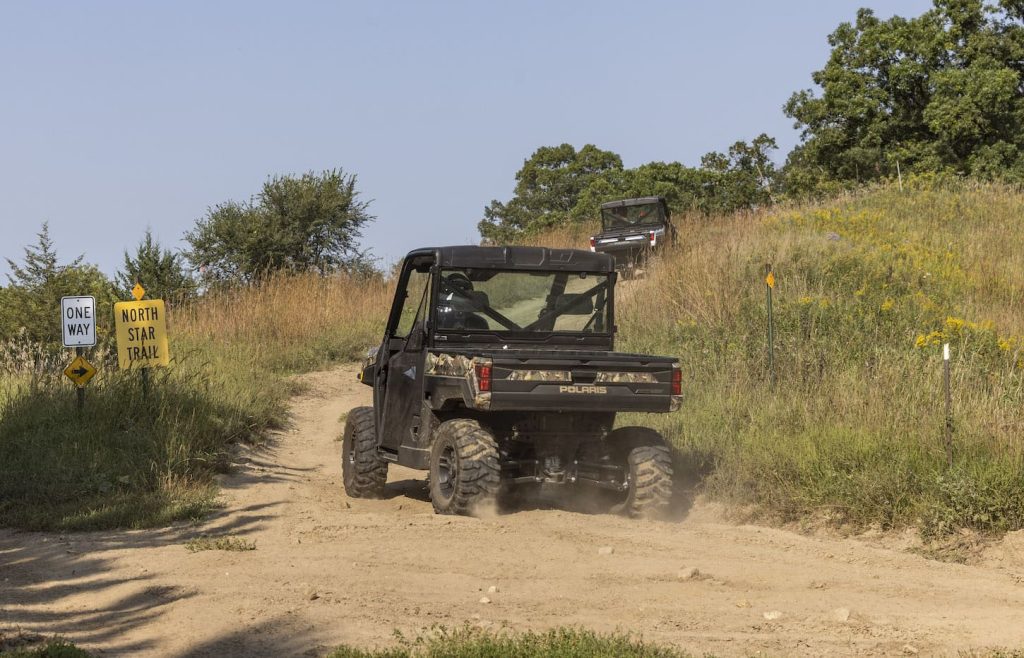
And yet I still felt like I was flying along in an adult go-kart, slinging dirt in every direction when I pulled serious Gs around turns. I know it’s built for work, and it’s great at that. But it’s just so dang fun to drive, too.
The power is unbelievable, and yet the vehicle is still so quiet. That makes it perfect for hunters, nature lovers, and anyone else who wants to trek deep into the woods without disturbing the local fauna.
If you’re in the market for a UTV and want the benefits that electric drive has to offer, the XP Kinetic should be at the top of your list. Good luck getting one though. They sold out nearly instantly when they were unveiled late last year, and who knows when they’ll be able to produce enough of them to supply the current demand.
You’ll definitely want to see it in action in my video below, or check out my full review!
Arcimoto FUV
Why ride around on four wheels when three will do the trick? That’s the idea behind the Arcimoto FUV, which is something of an autocycle meets motorcycle-class regulations, creating a super-fun and high-power electric vehicle that turns heads everywhere it goes.
The tadpole trike design puts two wheels up front and makes it super stable. You’re also in a real bucket seat instead of a motorcycle style saddle, meaning sharp turns still make you feel secure, unlike a three-wheeled motorcycle where you have to lean way over to one side and counterbalance on turns. The Arcimoto FUV is about as car-feeling as you can get on three-wheels.
I had the good fortune of stealing one for a couple days while attending the Micromobility America 2022 conference in San Francisco this fall. There I used it as my main transportation to get around the city. From winding through downtown streets to flying across the bridges at top speed (which is just shy of 80 mph (130 km/h), the FUV was a blast. It basically felt like I was in a street-legal go-kart.
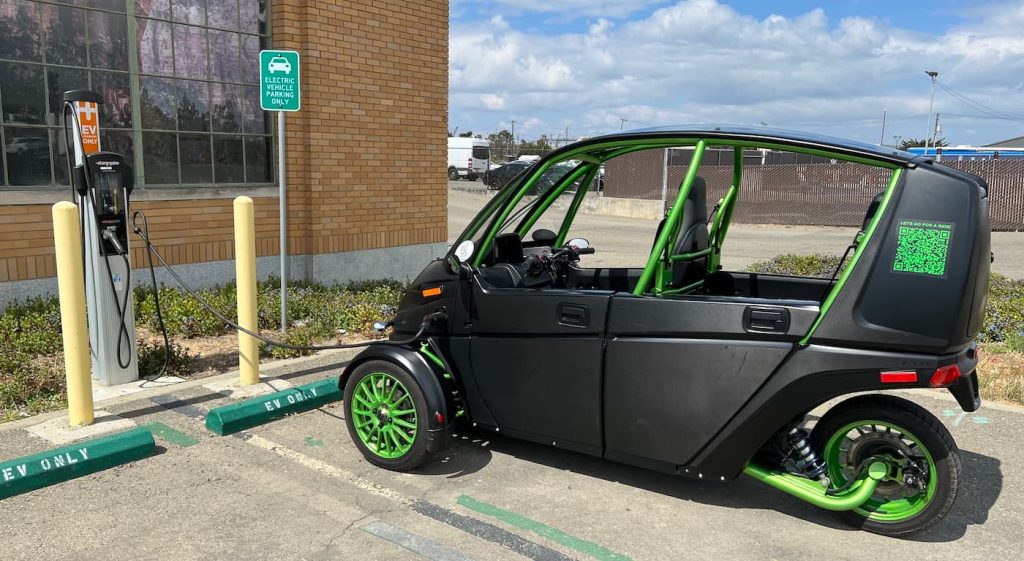
The J-1772 charging means I could pull up to any Level 2 public charger to top up my battery, and the dual seats gave me the option of either carrying a passenger or tossing my bags and other junk in the rear seat. There was also a small locking trunk in back that is big enough for a couple grocery bags or a backpack.
This isn’t the most practical EV I’ve ever seen, but it’s actually got more utility than an electric motorcycle since you can more securely carry passengers and even do some real grocery shopping or other light utility tasks with an FUV. I doubt it would be a good only vehicle for most people, but it would make a great “second car,” even if it’s not really a car.
For funsies, check out my video from my first test ride of an FUV last summer.
Candela C-8
Experiencing Candela’s flying electric boats feels like a once-in-a-lifetime opportunity. Somehow I’ve been lucky enough to have two of those experiences in my lifetime. Last summer I tested the company’s first model, the Candela C-7. This summer I returned to the beautiful Stockholm archipeligo to take a spin on the company’s newest model, the Candela C-8.
The C-8 is a totally different beast. It still flies on a pair of computer-controlled hydrofoils, dropping the energy usage of the boat to a tiny fraction of that of other fossil fuel-powered boats or even V-hull electric boats. But there are major differences compared to the C-7.
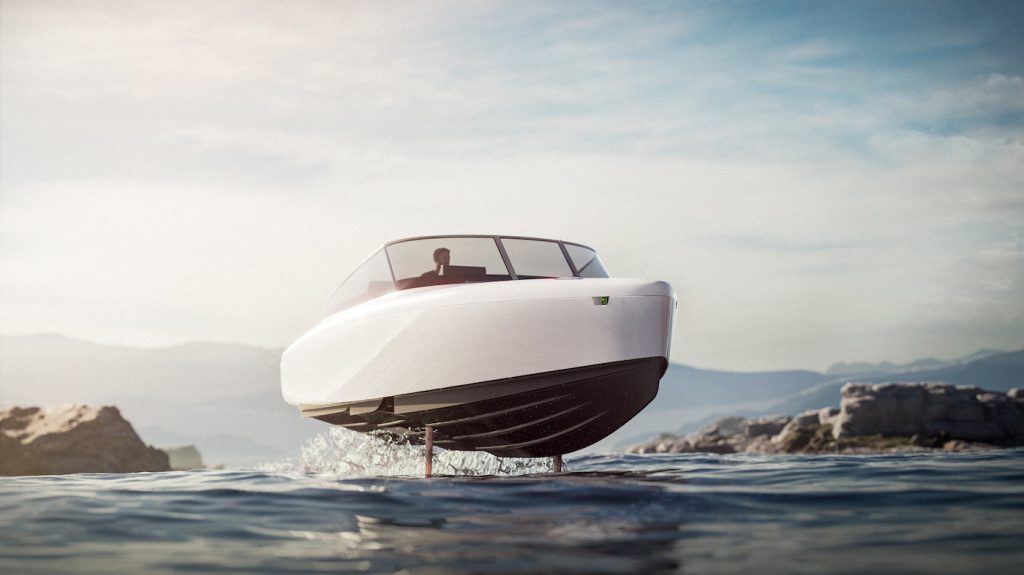
The C-8 is larger, has a totally different motor (that is a work of engineering art), is designed for mass production, has a below-deck cabin for sleeping or that can be outfitted with a marine toilet or shower, and has an awesome rear day bed for lounging out on the water.
I was amazed at how easy it was to control the boat, though the simplicity on the pilot’s side is thanks to a super sophisticated hardware and software interaction between a flight computer and the C-8’s hydrofoils. It was all designed in-house by Candela’s engineers and works like a masterpiece of aviation meets maritime technology.
It’s a fascinating electric boat that you should see for yourself in my video below.
LiveWire S2 Del Mar
I tested a lot of awesome electric motorcycles this year, and it’s hard to pick just one for this list. The Energicas were insanely powerful. I had a blast going off-road on the new Zero DSR/X. Smaller e-motos like the Ryvid Anthem and CSC RX1E were each a hoot in their own way. Even the SONDORS Metacycle pleasantly surprised me. But there was nothing like throwing a leg over one of the most anticipated electric motorcycles of the last few years: the LiveWire S2 Del Mar.
LiveWire is the electric motorcycle brand spun-off by Harley-Davidson. It already has a great bike in the form of the LiveWire One, but that model was developed by H-D. LiveWire’s first independent electric motorcycle will be the S2 Del Mar, which isn’t even shipping yet but I somehow still convinced somebody that I was important enough to get a ride on one.
In fact, as far as I can tell I’m one of two journalists to test-ride the LiveWire S2 Del Mar so far, months ahead of its expected rollout. And since the other guy apparently didn’t know which way a motorcycle throttle twists, I think you’re pretty much stuck with just me for any detailed reviews in 2022.
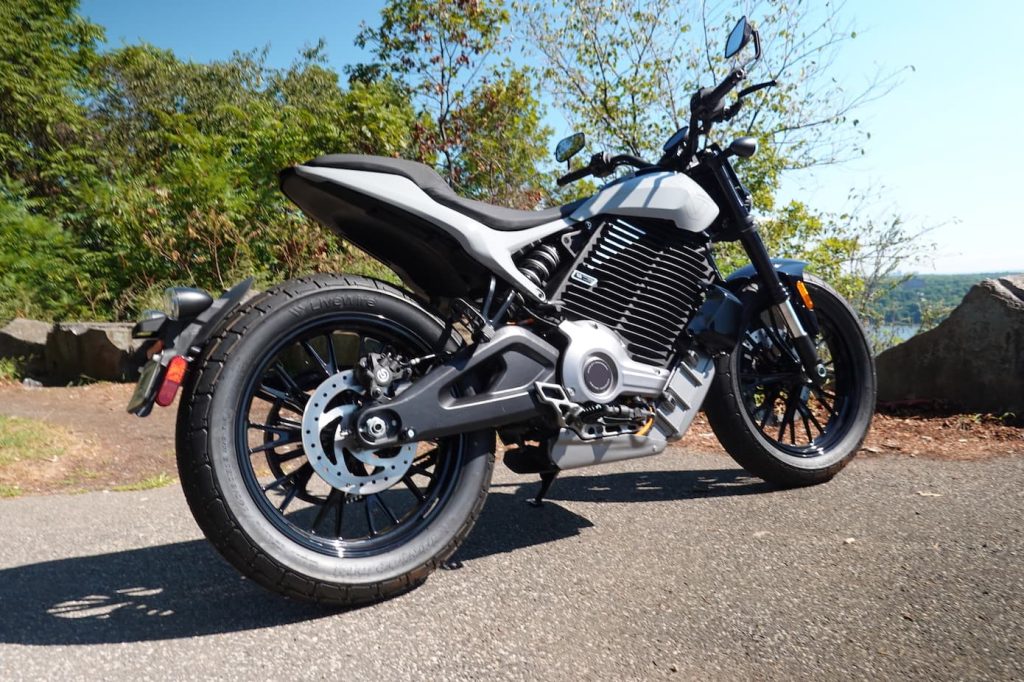
The LiveWire S2 Del Mar is largely known as the more affordable successor to the LiveWire One, coming in at closer to $17K, which isn’t cheap but surely will prove more accessible the $23K LiveWire One. And so I thought that the bike would be more toned down compared to the LiveWire One, but boy was I wrong! The S2 Del Mar is a beast in its own right.
The Del Mar has punchy acceleration that takes it up to 60 mph in just over three seconds flat. I think the official time is 3.1 seconds, but your butt won’t be able to tell the difference.
We don’t yet know the real battery or range specs since we’re still waiting on LiveWire to deliver the final details, but don’t expect the bike to be built for touring. I’m guessing we’ll see a battery capacity of around 10 kWh, meaning it will be plenty for commuter use but won’t be impressive when it comes to highway range. But that’s fine by me, since this bike feels like it’s all about the ride. It’s for cruising across LA, not cruising across the country. It’s a powerful bike that gives you all the sportiness you can fit into the city or suburbs, yet has the speed and power to handle the interstate as well – just not for long tours.
The comfortable seating position gives me legit roadster vibes that still carry trace amounts of H-D DNA, yet in an entirely new beast that will surely prove much more attractive to my generation.
Check out my test ride on the Del Mar below.
Chinese electric mini-truck
I can’t get enough of this little electric mini-truck, partly because it’s awesome, but also partly because it’s mine. It’s all mine! I bought it on Alibaba and imported it from China to the US, where it currently lives on my parents’ ranch.
It’s there because it’s not actually street legal, but it still works great as an off-road vehicle. Around the property it gets used for various chores like hauling yard waste, dragging the trash cans down the private road, filling and dumping top soil when planting trees (did I mention it has a hydraulic dump bed?) and just about everything else.
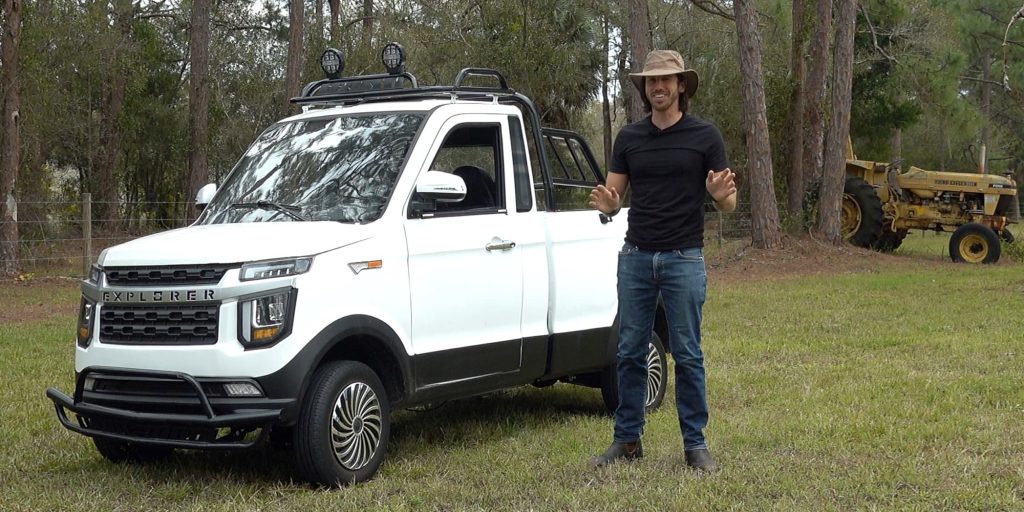
It’s not particularly powerful with around 5 kW of peak power, but that’s plenty for the small and lightweight truck that doesn’t need to go that fast anyway. It cost me $2,000 as the base price, though I put a bunch of upgrades in it before it left China that added to the price, bringing it up to about $3,500. But the larger battery, dump bed and air conditioning were all worth it.
Shipping was another $2,200 to get it to the US, but it was still worth it. A golf cart will run you $8,000-$10,000 these days, so this was better and cheaper. Locking doors, electric windows, real seats, glove box, backup camera, infotainment center and other creature comforts underscore what “real vehicle” this thing is. I’ve been using it all year and it has held up great. My parents have put even more miles on it than I have, and so far we haven’t had any issues.
We’ve even done a number of upgrades including knobby tires, a roof-mounted solar panel, and a planned bed liner (still in the works).
It may look silly, but it’s proven to be well worth the investment (and risk) of bringing it over!
FTC: We use income earning auto affiliate links. More.

